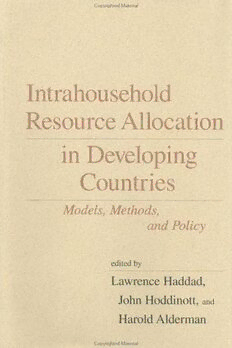
Intrahousehold resource allocation in developing countries: Models, methods, and policy PDF
358 Pages·17.166 MB·English
Most books are stored in the elastic cloud where traffic is expensive. For this reason, we have a limit on daily download.
Preview Intrahousehold resource allocation in developing countries: Models, methods, and policy
Description:
Although it is widely recognized that the welfare of an individual is, in large part, based on a complex set of economic and social interactions, development policies do not always acknowledge these. These interactions can affect, and be affected by, the creation, existence, and dissolution of institutions within which the individual is situated: family, household, business, club, or commune, to name a few. For the first two institutions in this list, both the processes by which resources are allocated among individuals and the outcomes of those processes are commonly referred to as 'intrahousehold resource allocation.'--from the IntroductionIn this new volume from the International Food Policy Research Institute, economists, demographers, sociologists, and anthropologists collaborate in the study of how resources are allocated within households in developing countries and why it matters from a policy perspective. Surveying a broad body of theory and evidence, the contributors examine the many social and cultural factors that influence decisions at the family and household level about the allocation of time, income, assets, and other resources. Shedding new light on a process that is often hidden from view and difficult to measure, they show that a more complete understanding of intrahousehold behavior can increase the likelihood that policies will reach the people they are intended to affect--leading to better policies in areas such as food production and consumption, nutrition, natural resource management, and fertility.Contributors: Harold Alderman, Howarth E. Bouis, Judith Bruce, Michael R. Carter, Pierre-Andr? Chiappori, Jennie Dey Abbas, Nancy Folbre, Paul Gertler, Joel Gittelsohn, Jane I. Guyer, Lawrence Haddad, Barbara Harriss-White, John Hoddinott, Elizabeth G. Katz, Cynthia B. Lloyd, Shelly Lundberg, Marjorie B. McElroy, Sangeeta Mookherji, Christine L. Pe?a, Mark M. Pitt, Robert A. Pollak, Duncan Thomas "This book succeeds admirably in surveying a diverse body of theory and evidence on intrahousehold allocation. It is exceptionally well organized and cohesive for a collection of articles by so many authors."--Jere R. Behrman, University of PennsylvaniaInternational Food Policy Research Institute
See more
The list of books you might like
Most books are stored in the elastic cloud where traffic is expensive. For this reason, we have a limit on daily download.
